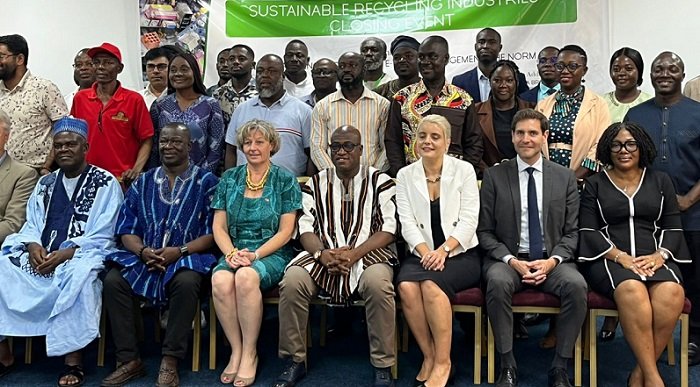The Sustainable Recycling Industries (SRI), a project launched in 2013 by the Environmental Protection Authority (EPA) to establish favourable framework conditions to promote the development of a sustainable recycling industry for e-waste in the country has been brought to an end.
The project, which was jointly implemented by six organisations, namely EPA, Ghana National Cleaner Production Centre, Mountain Research Institute, Institute for Material Science and Technology (EMPA), Oeko Institute and World Resources Forum (WRF) was funded by State Secretariat for Economic Affairs (SECO).
Speaking at the closing ceremony held in Accra yesterday, the Minister of Environment, Science and Technology, Dr Ibrahim Murtala Muhammed, noted that the event marked not only the end of a significant project, but the beginning of a lasting commitment to sustainable e-waste management in the country.
He stressed that at the time the project commenced in 2013, the country was faced with severe challenges in managing e-waste, particularly in areas like Agbogbloshie, the largest e-waste recycling cluster in West Africa.
The Minister stressed that Agbogbloshie became notorious for unsafe practices like open burning of cables and dismantling of electronics in hazardous conditions, resulting in significant environmental and health risks.
“But today, we celebrate how far we have come, thanks to collaborative efforts and the steadfast support of the Swiss Government through SECO, a framework for the environmentally sound management of e-waste in Ghana has been established,” he said.
“Ghana ratified the Basel Convention and domesticated it through the Hazardous and Electronic Waste Control Act, 2016 (Act 917), and L.I. 2250, however, prior to the SRI project, there was no specific e-waste policy or legislation, and most e-waste was managed informally under unsound practices,” the Minister added.
Dr Muhammed said the provided valuable support for the establishment of a framework for environmentally sound management of e-waste along the value chain, included awareness creation, capacity building both for the formal and informal sectors, financing mechanisms, technology partnerships, conformity assessment and management of hazardous components.
The Minister noted that the impact of the project was significant as it provided safe and sustainable jobs for the youth, protection for value chain workers, retrieval of valuable components, and promotion of downstream industries.
The Acting Chief Executive Officer of EPA, Prof. Nana Ama Brown Klutse, whose speech was read on her behalf by the Director, Climate Change and Ozone Department of EPA, Mr Felix Addo-Okyireh, said sustainable waste management especially sustainable e-waste management was critical to the attainment of a number of SDGs.
She said the SRI project had supported the authority to effectively have capacity building for personnel across the entire e-waste value chain; scrap dealers, regulators, recyclers, importers, policy support through policy briefs, business support through the expert pool and development of technical guidelines to support effective regulation of the sector.
BY CECILIA YADA LAGBA
